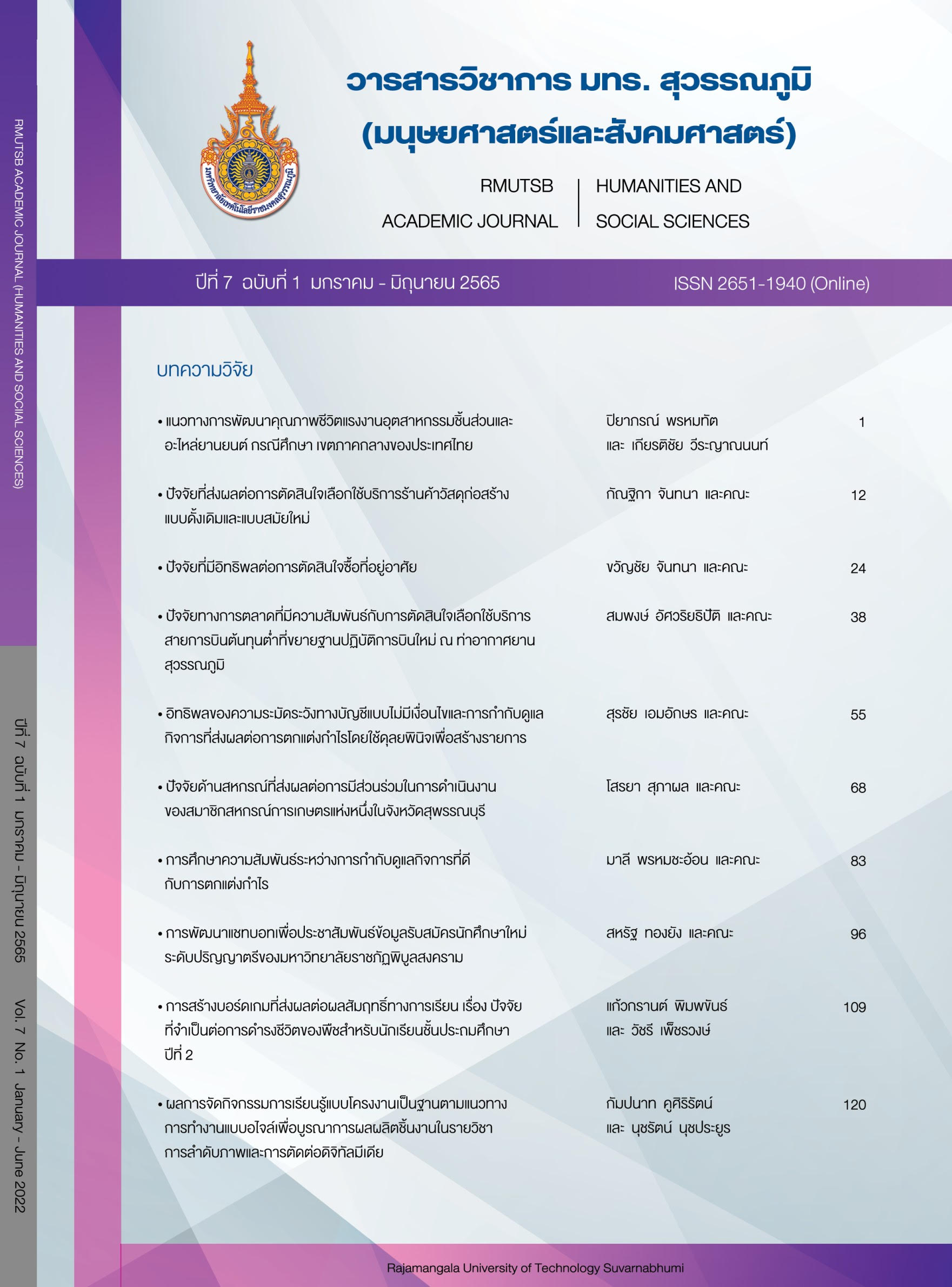The influence of unconditional accounting conservatism and corporate governance on real earning management
Main Article Content
Abstract
This research aims to study the influence of unconditional accounting conservatism to study the influence of corporate governance and to study the interaction effect of unconditional accounting conservatism and corporate governance, on the real earning management. The 348 companies listed on the Stock Exchange of Thailand in 2019 were studied.
The Hayn's (1995) model was used to measure unconditional accounting conservatism, the Roychowdhury (2006) model was used to measure real earning management, and the CG Score was used to measure good corporate governance. Descriptive statistics, correlation analysis and multiple regression analysis were used to examine relationships among factors. The research found that unconditional accounting conservatism was a positive influence on the real earning management, and when the company use unconditional accounting conservatism in conjunction with good corporate governance, this can reduce the positive influence. Therefore, investors should choose to invest in companies with good corporate governance in order to avoid the effects of profit manipulation by management.
Article Details

This work is licensed under a Creative Commons Attribution-NonCommercial-NoDerivatives 4.0 International License.
References
Alarlooq, M. N. M., Aslani A., & Azadi, B. (2014). Accounting conservatism impact on real earnings management. International Journal of Accounting Research, 1(12), 71-76.
Allison, P. (2012). When can you safely ignore multicollinearity? Retrieved 3 March 2021, from https://statisticalhorizons.com/multicollinearity
Bank of Thailand. (2019). Thailand economic report 2019, Retrieved 3 March 2021, from https://www.bot.or.th/Thai/MonetaryPolicy/EconomicConditions/AnnualReport/AnnualReport/AanualReport2562.pdf (in Thai)
Basu, S. (1997). The conservatism principle and the asymmetric timeliness of earnings. Journal of Accounting and Economics, 24(1), 3-37.
Beaver, W., & Ryan, S. (2005). Conditional and unconditional conservatism: Concepts and modeling. Review of Accounting Studies, 10(2-3), 269-309.
Burgstahler, D. C., & Dichev, I. D. (1997). Earnings management to avoid earnings decreases and losses. Journal of Accounting and Economics, 24(1), 99-126.
Bunjai, D., & Nakprasit, C. (2019). The effects of corporate governance and financial ratios on the corporate social performance disclosure of manufacturing companies registered in the Stock Exchange of Thailand. RMUTSB Academic Journal (Humanities and Social Sciences), 4(1), 47-60. (in Thai)
Charoenkijjarukorn, P. (2013). Sarbanes-Oxley act and management of foreign affairs towards good governance in Thailand. Chulalongkorn Business Review, 35(4), 92-119. (in Thai)
Chen, Q., Hemmer T., & Zhang, Y. (2007). On the relation between conservatism in accounting standards and incentives for earnings management. Journal of Accounting Research, 45(3), 541-565.
Cohen, D. A., Dey, A., & Lys, T. Z. (2008). Real and accrual-based earnings management in the pre and post Sarbanes-Oxley periods. The Accounting Review, 83(3), 757-787.
Degeorge, F., Patel J., & Zeckhauser, R. (1999). Earnings management to exceed thresholds. Journal of Business, 72(1), 1-33.
Demski, J. S. (2004). Endogenous expectations. The Accounting Review, 79(2), 519-539.
Ewert, R., & Wagenhofer, A. (2005). Economic effects of tightening accounting standards to restrict earnings management. The Accounting Review, 80(4), 1101-1124.
Guay, W., & Verrecchia, R. (2006). Discussion of an economic framework for conservative accounting and Bushman and Piotroski. Journal of Accounting and Economics, 42(1-2), 149-165.
Hayn, C. (1995). The information content of losses. Journal of Accounting and Economics, 20(2), 125-153.
Jacob, J., & Jorgensen, B. (2007). Earnings management and accounting income aggregation. Journal of Accounting and Economics, 43(2/3), 369-90.
Jensen, C., & Mecking, H. (1976). Theory of the firm: Managerial behavior, agency costs and ownership structure. Jounal of Financial Econonmics 3(4), 305-360.
Katmon, N., & Farooque, O. A. (2017). Exploring the impact of internal corporate governance on the relation between disclosure quality and earnings management in the UK listed companies. Journal of Business Ethics, 142, 345-367.
Phattharathawisuk, P. (2017). How corporate governance affects the relation between unconditional conservatism and real earning management? Journal of Accounting Profession, 13(37), 15-28. (in Thai)
Poowadin, P., Waiyawout, K., & Kittilapanon, N. (2020). Corporate sustainability information disclosure effect on business performance of the financial institutions in Indonesia, Thailand, Philippines, and Singapore. RMUTSB Academic Journal (Humanities and Social Sciences), 5(2), 136-152. (in Thai)
Roychowdhury, S. (2006). Earnings management through real activities manipulation. Journal of Accounting and Economics, 42(3), 335-370.
The Stock Exchange of Thailand. (2012). Good corporate governance principles for listed companies 2012. Retrieved 3 March 2021, from https://www.set.or.th/sustainable_dev/th/cg/files/2013/CGPrincipleCGPrinciple2012Thai-Eng.pdf (in Thai)
Vanichbuncha, K. (2007). Statistical analysis: Statistics for administration and research (10th ed.). Bangkok: Chulalongkorn University Press. (in Thai)
Watts, R. L. (2003). Conservatism in accounting – Part I: Explanations and implications. Accounting Horizons, 17(3), 207-221.


